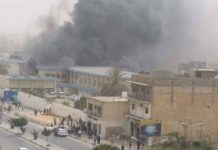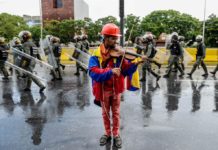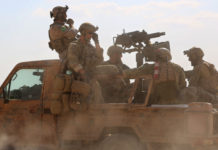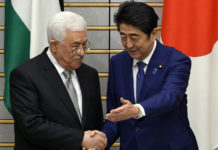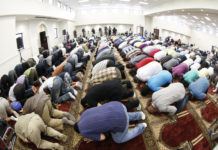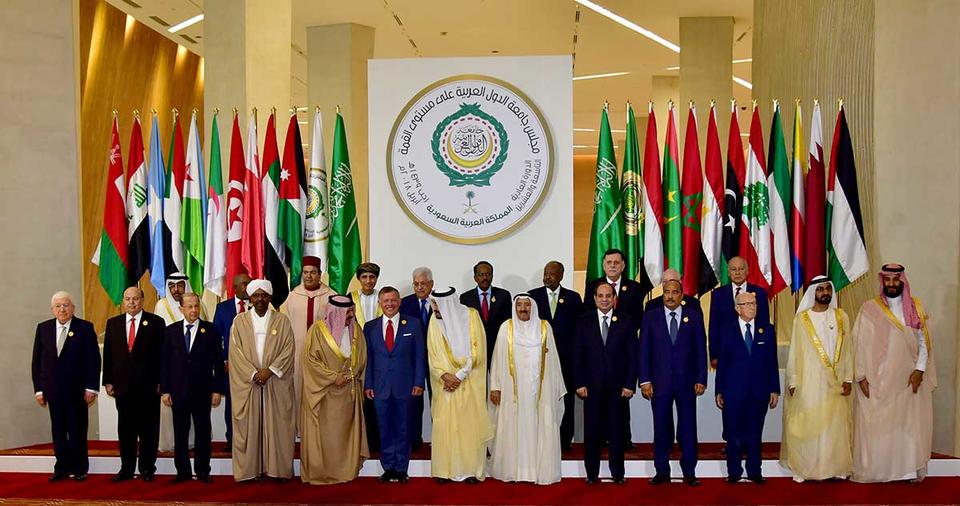April seems to be a full month for Syria in terms of war, attacks, fragmentation and division. It is also a full month for the Arabs in terms of peace and normalisation by means of politicians’ visits and billion-dollar deals, as well as the summit for reconciliation and negotiations, followed by statements of condemnation, denunciation and support, all amidst traditional Bedouin hospitality.
I will start with the ground war in Syria. It is on multiple fronts and has many parties involved. At the beginning of April, Turkey announced that it had achieved the objectives of Operation Olive Branch. These included the complete control of Afrin, in north-west Syria, after defeating the Kurdish armed forces in the area, among them the Syrian Democratic Forces (SDF) and the People’s Protection Units (YPG). The Turkish operation lasted several months, took place amid international silence and was overlooked by all parties; not even Israel objected.
The process of ridding Eastern Ghouta of armed groups, represented either by the Syrian opposition or foreign fighters, began with action by joint Russian-Syrian forces. As usual, their missiles, rockets and barrel bombs did not distinguish between insurgents and civilians; as usual, hundreds of victims of all ages died, and the so-called free world did nothing about it.
On 7 April, Bashar Al-Assad, also as usual, bombed a civilian area with his chemical weapons, killing almost 70 people, including children. Only when the horrific images of the victims spread widely across social media platforms did the conscience of the free world feel moved to do something. After a few days of political manoeuvres, the US, Britain and France attacked ambiguous Syrian targets. They fired over 100 missiles, and then issued statements saying that they all hit their targets. However, they did not mention the nature of the targets that were hit and how much damage they caused. The important thing is that everyone remained calm, with some face-saving statements thrown in for good measure.
Then the newsrooms pointed their lenses at Tel Aviv and Tehran, where indications of a small war between Israel and Iran on Syrian territory emerged. The two parties exchanged threats that each would completely destroy the other, and things calmed down.
The war in Syria continued. After all these events, on 20 April Russian Foreign Minister Sergey Lavrov said that Syria seems to be headed towards division. He also insisted in all of his statements — as did President Vladimir Putin — that the Russian forces entered the fray in Syria to preserve its territorial integrity, unity and safety.
The 29th Arab Summit was scheduled to be held in March, but the host country, Saudi Arabia, coordinated with the Arab League secretariat and decided to postpone the get-together until April. This was preceded by the announcement of the re-election of Egyptian President Abdel Fattah Al-Sisi for a second term, and the visit of Saudi Crown Prince Mohammad Bin Salman to Egypt, Britain, the United States and France.
Bin Salman’s trip to Cairo resulted in the allocation of 1,000 square kilometres on the Red Sea coast of Egypt for his giant Neom project, as well as Saudi investments in Egypt totalling around $10-12 billion to be paid in stages. In Britain, he was met with royal hospitality, resulting in arms and trade deals. Washington was next up, where the de facto Saudi ruler met the new Emperor Trump, who reminded the Crown Prince of the deals made during his visit to Riyadh last May, which amounted to almost $500 billion, and which are in the process of being implemented. Large colourful charts indicated that he was awaiting more deals, as the Saudis have a lot of money and the American Emperor wants a share of it in order to provide millions of jobs for American citizens. The Saudi Prince did not disappoint Trump, and new deals were agreed, amounting to a further $400 billion.
Completing his tour across America, Bin Salman met with political and military figures who have experience with what was and is happening in the Arab region, from Palestine to Iraq, Syria, Libya, Yemen and elsewhere. Then he went to France and Spain, both of which received a share of Saudi Arabia’s wealth, albeit a relatively small share. France got deals worth less than $20 billion, while Spain’s were less than $3 billion. Back home, the Crown Prince got set to oversee the final arrangements for the Arab Summit.
Abu Dhabi’s Crown Prince Mohammed Bin Zayed, meanwhile, had previously announced that he would visit the US for unspecified reasons, but it did not happen. The Emir of Qatar, Sheikh Tamim Bin Hamad Al-Thani, did go to the US, though, as scheduled, and received a warm welcome and reception at the White House. Qatar and the US are linked by a strategic military alliance, and America’s most important military base in the Gulf, Al-Udeid, is located in Qatar.
Before the leaders, and the representatives of those who were not able to be present, met at the summit in Dhahran, the above-mentioned events took place in Syria. Qatar, Saudi Arabia, the UAE, Bahrain, and Kuwait all expressed their absolute support for the tripartite air strikes against the Assad regime’s “chemical weapons” sites. This closed the door to the issue being discussed at the summit. However, none of these countries, nor any others, made mention of Turkey’s Operation Olive Branch, leaving the same door open for its condemnation.
The Arab Summit ended, as did many before it, and the cycle of Arab life returned to normal, as dictated not by those present, but by the wishes of the real driving forces, which are not in the Arab world. The agonies and screams of the Arabs in Syria were lost in the mayhem and confusion of the war. The calls of the people in Yemen, where millions are suffering from disease and hunger, and are on the verge of a humanitarian disaster in the middle of a war and political division, were also lost. Soo too were the voices of the people of Libya, where the West, the East, the South and those supporting General Khalifa Haftar, who has disappeared due to illness, are hunting for his replacement; those supporting the Tripoli government are still fighting. Libya is also clearly on the road to division.
The list is long, and goes on until it reaches the core existential issue, the Palestinian cause. The liquidation of the cause in the “Deal of the Century” or any other century will be the final curtain call in the existence of the Arab nation. We can hear the screams of the Palestinian people across the Israeli security barrier as they participate in the Great Return Marches. It is as if these are the final calls to save the nation. We hear them, but is anyone actually listening? And will anyone answer them?
This article was originally published on Middle East Monitor, translated from Al Araby Al Jadid.
